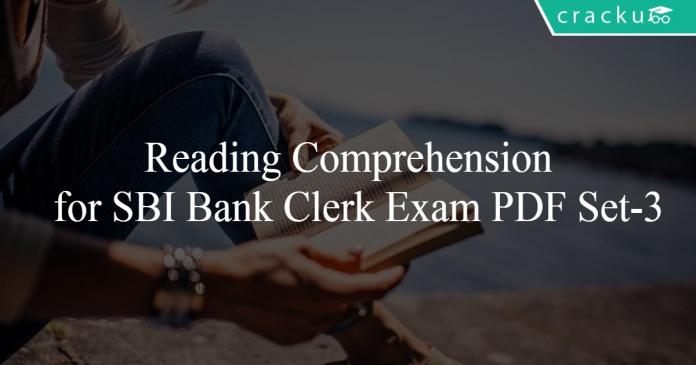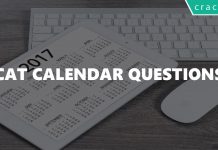Reading Comprehension for SBI Clerk PDF Set-3
Download SBI Clerk Reading Comprehension Questions & Answers Set-3 PDF for SBI Clerk Prelims and Mains exam. Very Important SBI Clerk Reading Comprehension Questions with solutions.
Download Reading Comprehension PDF Set-3
105 SBI Clerk mocks for Rs. 199. Enroll here
Instructions
Directions: Read the following passage carefully and answer the questions given below it.
Following the end of the Second World War, the United Kingdom enjoyed a long period without a major recession (from 1945 – 1973) and a rapid growth in prosperity in the 1959s and 1960s. According to the OECD, the annual rate of growth (percentage change between 1960 and 1973 averaged 2.9%, although this figure was far behind the rates of other European countries such as France, West Germany, and Italy. However, following the 1973 oil crisis and the 1973-1974 stock market crash, the British economy fell into recession and the government of Edward Heath was ousted by the Labour Party under Harold Wilson. Wilson formed a minority government on 4 March 1974 after the general election on 28 February ended in a hung parliament. Wilson subsequently secured a three-seat majority in a second election in October that year. The UK recorded weaker growth than many other European nations in the 1970s; even after the early 1970s recession ended, the economy was still blighted by rising unemployment and double-digit inflation. In 1976, the UK was forced to request a loan of $ 2.3 billion from the International Monetary Fund. The then Chancellor of the Exchequer Denis Healey was required to implement public spending cuts and other economic reforms in order to secure the loan. Following the Winter of Discontent, the government of James Callaghan lost a vote of no confidence. This triggered the May 1979 general electron which resulted in Margaret Thatcher’s Conservative Party forming a new government. A new period of neo-liberal economics began in 1979 with the election of Margaret Thatcher who won the general election on 3 May that year to return the Conservative Party to the government after five years of Labour government. During the 1980s most state-owned enterprises were privatized, taxes cut and markets deregulated. GDP fell 5.9 % initially but growth subsequently returned and rose to 5% at its peak in 1988, one of the highest rates of any European nation. The UK economy had been one of the strongest economies in terms of inflation, interest rates and unemployment, all of which remained relatively low until the 2008-09 recession. Unemployment has since reached a peak of just under 2.5 million (7.8 %), the highest level since the early 1990s, although still far lower than some other European nations. However, interest rates have reduced to 0.5 % pa. During August 2008 the IMF warned that the UK economic outlook had worsened due to a twin shock : financial turmoil and rising commodity prices. Both developments harm the UK more than most developed countries, as the UK obtains revenue from exporting financial services while recording deficits in finished goods and commodities, including food. In 2007, the UK had the world’s third largest current account deficit, due mainly to a large deficit in manufactured goods. During May 2008, the IMF advised the UK government to broaden the scope of fiscal policy to promote external balance. Although the UK’s labour productivity per person employed¡¨ has been progressing well over the last two decades and has overtaken productivity in Germany, it still lags around 20% behind France, where workers have a 35 hour working week. the UK’s labour productivity per hour worked is currently on a par with the average for the sold EU (15 countries). In 2010, the United Kingdom ranked 26th on the Human Development Index. The UK entered a recession in Q2 of 2008, according to the Office for National Statics and exited it in Q4 of 2009. The subsequently revised ONS figures show that the UK suffered six consecutive quarters of negative growth, making it the longest recession since records began. As of the end of Q4 2009, revised statistics from the Office for National Statistics demonstrate that the UK economy shrank by 7.2% from peak to trough. The Blue Book 2013 confirms that UK growth in Q2 of 2013 was 0.7 %, and that the volume of output of GDP remains 3.2% below its prerecession peak; The UK economy’s recovery has thus been more lackluster than previously thought. Furthermore The Blue Book 2013 demonstrates that the UK experienced a deeper initial downturn than all of the G7 economies save for Japan, and has experienced a slower recovery than all but Italy. A report released by the Office of National Statistics on 14 May 2013 revealed that over the six-year period between 2005 and 2011, the UK dropped from 5th place to 12th place in terms of household income on an international scale ¡X the drop was partially attrib10 uted to the devaluation of sterling over this time frame. However, the report also concluded that, during this period, inflation was relatively less volatile, the UK labour market was more resilient in comparison to other recessions, and household spending and wealth in the UK remained relatively strong in comparison with other OECD countries. According to a report by Moody’s Corporation, Britain’s debt-to-GDP ratio continues to increase in 2013 and is expected to reach 93% at the end of the year. The UK has lost its triple. A credit rating on the basis of poor economic outlook. 2013 Economic Growth has surprised many Economists, Ministers and the OBR in the 2013 budget projected annual growth of just 0.6 %. In 2013 Q1 the economy grew by 0.4 % Q2 the economy grew by 0.7 % and Q3 the economy is predicted to have grown at 0.8%.
Question 1: A report of Office of National Statistics revealed that between 2005 and 2011, the UK dropped from 5th place to 12th place in terms of
a) exports on an international scale
b) imports on an international scale
c) household income on an international scale
d) agricultural productivity
e) None of these
Question 2: According to a report by Moddy’s, Britain’s debt to GDP ratio is expected to reach ____ at the end of 2013.
a) 90 percent
b) 80 percent
c) 87.3 percent
d) 93 percent
e) None of these
Question 3: A new period of neo-liberal economics began in United Kingdom with the election of Margaret Thatcher after five years of Labour government. Margaret Thatcher came in power in
a) 1980
b) 1976
c) 1979
d) 1982
e) None of these
Question 4: According to the OECD, the annual rate of growth of United Kingdom’s economy between 1960 and 1973 averaged.
a) 2.9%
b) 2.34%
c) 2.87%
d) 5.9%
e) None of these
Question 5: During August 2008, International Monetary Fund warned that the United Kingdom economic outlook had worsened due to a twin shock. What were the twin shocks?
a) Financial turmoil and decreasing commodity prices
b) Financial turmoil and rising commodity prices
c) Increasing exports and decreasing imports
d) Low industrial growth and increasing imports
e) None of these
Instructions
Read the following passage carefully and answer the question given below it. Certain words are printed in bold to help you to locate them while answering some of the question.
Once upon a time in a village, there lived six blind men. In spite of their blindness they had managed to educate themselves Seeking to expand their knowledge they decided to visit a zoo and try out their skills in recognizing animals by their touch. The first animal they came across, as soon as they entered the zoo was an elephant.
As the first man approched the elephant, the elephant waved its trunk, and the man felt something brush past him. Managing to hold on to it, and found something long and moving. He jumped back in alarm, shouting “Move away ! This is a snake !” Meanwhile ,the second man had moved closer, and walked right near its legs. As the man touched the thick, cylindrical¬shaped legs, he called out “Do not worry. These are just four trees here. There is acertainly no snake !” The third man was curious hearing the other two, and moved forward. As he walked towards the elephant, he felt his hand touch one of the tusks. Feeling the smooth, sharp ivory tusk, the man cried out ” Be careful ! There is a sharp spear here”. The fourth man cautiously walked up behind the elephant and felt its swinging tail. “It’s just a rope ! he said. The fifth man had meanwhile reached out and was touching the huge ears of the animal. “I think all of you have lost your sense of touch !” he said. “This is nothing but a huge fan!” The sixth man did not want to be left out. As he walked towards the elephant, he bumped into the massive body, and he exclaimed, “Hey ! This is just a huge mud wall ! There is no animal at all !” All six of them were convinced that they were right, and began arguing amongst themselves.
The zoo keeper returned to the elephant and saw each of them shouting at the top of their voice ! “Quiet” he shouted out and when they had calmed down, he asked, “Why are all of you shouting and arguing in this manner ?” They replied, “sir, as you can see, we all are blind. We came here to expand our knowledge. We sensed an animal here and tried to get an idea of its appearance by feeling it. However, we are not able to arrive at a consensus over its appearance, and hence are arguing. Can you please help us and tell us which of us is right” ?
The zoo keeper laughed before answering “My dear men, each of you has touched just one portion of the animal. The animal you see is neither a snake, nor any of other things you have mentioned. The animal in front on you is an elephant !” As the men, bowed their head ashamed of the scence they had created, the zoo keeper said, “My dear men, this is a huge animal and luckily, it is tame. It stood by calmly as each of you touched it. You are extremely lucky that it stayed calm even during your argument, for if it had got angry, it would have trampled all of you to death !” He continued further , “It is also important to learn to share and pool your knowledge .Instead of fighting amongst yourselves, if you had tried to put all your observations together, you might have had an idea of the animal as a whole ! Also, when you cannot see the entire truth, it is better to go to someone who does know the complete truth, rather than guess about small parts of it. Such half¬knowledge is not only useless, but also dangerous. If you had come directly to me, I would have helped you identify all the animals without putting you in danger !” The six men apologized to the zoo keeper, and assured him that they had learnt their lesson. From now on they would seek true knowledge from qualified people, and would seek true knowledge from qualified people, and would also try to work together as a team so that they could learn more
Question 6: Which part of the elephant resembled a big fan ?
a) The wide ears
b) The mouth
c) The long slender trunk
d) The big wrinkled body
e) The end of the tail
Question 7: Why did the six blind men visit the zoo ?
a) They wanted to touch an elephant
b) They had heard a lot about animals
c) They wanted to visit the animal in the zoo
d) They wished to recognize animal by their touch and feel
e) They had never been to a zoo before
Download SBI Clerk Previous Papers PDF
Question 8: What was the first thing the blind men came across as they entered the zoo ?
a) A large mud wall
b) The zoo keeper
c) The trees
d) The elephant
e) A snake
Question 9: Why is it that each of the six blind men had different impression of the elephant ?(A) Each of them touched only a portion of the elephant(B) Each of the six blind men approched different animals(C) The blind men were touching the surroundings instead of the elephant(D) They had never touched an elephant before
a) Only (A)
b) Only (A) and (C)
c) Only (C)
d) Only (B) and (D)
e) Only (B)
Question 10: Why were the six men arguing and shouting amongst themselves ?
a) Each of them wanted his voice to be heard over and above the others
b) Each of them thought he was right about the animal
c) There was a lot of noise in the zoo and they couldn’t hear each other
d) They were having an interesting debate
e) None of these
Question 11: What advice did the zoo keeper give to the six blind men ?
a) That the elephant was tame and obedient
b) That they were very lucky to have had the opportunity to visit the zoo
c) That it was important to share knowledge and work together as a team
d) That they were not qualified to be knowledgeable individuals
e) That the elephant is made up of different parts
Question 12: Which statement best describes the zoo keeper’s behaviour towards the six blind men ?
a) The zoo keeper insulted the six men
b) The zoo keeper presented himself to be as ignorant as they were
c) The zoo keeper helped them and assisted them further
d) The zoo keeper was indifferent towards the six blind men
e) The zoo keeper prohibited the six blind men from entering the zoo
Question 13: Choose the word which is most similar in meaning as the word, ‘convinced’, printed in bold as used in the passage.
a) Certain
b) Doubtful
c) Pressured
d) Committed
e) Daring
Question 14: Choose the word which is most similar in meaning as the word, ‘pool’, printed in bold as used in the passage.
a) Expand
b) Gather
c) Devote
d) Apply
e) Combine
Question 15: Choose the word which is most similar in meaning as the word, ‘consensus’, printed in bold as used in the passage.
a) Harmony
b) Agreement
c) Information
d) Order
e) Inference
Answers & Solutions:
1) Answer (C)
As per the passage “A report released by the Office of National Statistics on 14 May 2013 revealed that over the six-year period between 2005 and 2011, the UK dropped from 5th place to 12th place in terms of household income on an international scale”
2) Answer (D)
According to a report by Moody’s Corporation, Britain’s debt-to-GDP ratio continues to increase in 2013 and is expected to reach 93% at the end of the year.
3) Answer (C)
The author mentions in the passage that Margaret Thatcher came to power in 1979.
4) Answer (A)
The passage mentions that OECD estimated UK’s growth rate to be 2.9% between 1960 and 1973.
5) Answer (B)
As per the passage “During August 2008 the IMF warned that the UK economic outlook had worsened due to a twin shock : financial turmoil and rising commodity prices.”
6) Answer (A)
The fifth man touched the huge ears of the elephant. He though them as huge fans.
Hence, the correct option is A.
7) Answer (D)
The six men, inspite their blindness had managed to educate themselves. In order to expand their knowledge.
They intended to do so by recognizing animal by their touch and feel.
Hence, the correct option is option D.
8) Answer (D)
As stated cearly, the first animal that blind men came across was an elephant.
Hence, the correct option is option D.
105 SBI Clerk mocks for Rs. 199. Enroll here
15000 Free Banking Solved Questions
9) Answer (A)
The blind men were touching different potion of the elephant.
Therefore, they had different impression of the elephant.
Hence, only statement A is correct and correct option is option A.
10) Answer (B)
The six men had different impression of the elephant as they had touched different portion of the animal. However, each of them thought he was correct. This led to arguing and shouting among themselves. Hence, the correct option is B.
11) Answer (C)
The zoo keeper made them that instead of fighting and shouting, they must share their knowledge and work together as team to be sucessful in their endeavour.
Hence, the correct option is option C.
12) Answer (C)
The zoo keeper advised the blind man. He assisted them and helped them. Only option C describes the actions of zoo keeper and hence the correct option is option C.
13) Answer (A)
In the context of passage, convinced refers to being certain. The blindmen were covinced i.e that only their individual impressions of the elephant were correct.
14) Answer (E)
In the context of passage, pool refers to combining. The zoo keeper uses the word to denote their combining their knowledge. Hence, the correct option is E.
15) Answer (B)
In the context of passage, consensus refers to agreement.
The blind men couldn’t have consensus i.e they couldn’t agree.
Hence, the correct option is option B.
105 SBI Clerk mocks for Rs. 199. Enroll here
Download SBI Free Preparation App
We hope this Reading Comprehension Questions & Answers set-3 PDF of SBI Clerk is very Useful for preparation of SBI Clerk Exams.





![How To Manage Time In CAT Exam? [Section-wise Tips] How to manage time in CAT exam ?](https://cracku.in/blog/wp-content/uploads/2018/09/fig-03-09-2018_10-54-46-218x150.jpg)